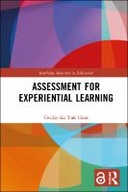Explore

Assessment for Experiential Learning
Cecilia Ka Yuk Chan
2023
0 Ungluers have
Faved this Work
Login to Fave
Chan’s book explores the challenges in assessing experiential learning, deepens our understanding, and inspires readers to think critically about the purpose of assessment in experiential learning.
Experiential learning has been studied and proven to be effective for student learning, particularly for the development of holistic competencies (i.e. 21st century skills, soft skills, transferable skills) considered essential for individuals to succeed in the increasingly global and technology-infused 21st century society. Universities around the world are now actively organising experiential learning activities or programmes for students to gain enriching and diversified learning experiences, however the assessment of these programmes tends to be limited, unclear, and contested.
Assessment plays a central role in education policies and students’ approach to learning. But do educators know how to assess less traditional learning such as service learning, entrepreneurship, cross-discipline or cross-cultural projects, internships and student exchanges? While the current assessment landscape is replete with assessments that measure knowledge of core content areas such as mathematics, law, languages, science and social studies, there is a lack of assessments and research that focus on holistic competencies. How do we assess students’ ability to think critically, problem solve, adapt, self-manage and collaborate?
Central to the discussion in this book, is the reason students are assessed and how they should be assessed to bring out their best learning outcomes. Offering a collection of best assessment practice employed by teachers around the world, this volume brings together both theoretical and empirical research that underpins assessment; and perceptions of different stakeholders – understanding of assessment in experiential learning from students, teachers, and policymakers. The idea of assessment literacy also plays an important role in experiential learning, for example, reflection is often used in assessing students in experiential learning but how reflection literate are educators, are they aware of the ethical dilemmas that arise in assessing students? These questions are discussed in detail. The volume also introduces a quality assurance programme to recognise student development within experiential learning programmes.
The book will be particularly informative to academic developers, teachers, students and community partners who struggle with the development and assessment for experiential learning, those who plan to apply for funding in experiential learning, and policymakers and senior managements seeking evidence and advice on fine-tuning curricular, assessment designs and quality assurance.
This book is included in DOAB.
Why read this book? Have your say.
You must be logged in to comment.
Rights Information
Are you the author or publisher of this work? If so, you can claim it as yours by registering as an Unglue.it rights holder.Downloads
This work has been downloaded 30 times via unglue.it ebook links.
- 30 - pdf (CC BY-NC-ND) at OAPEN Library.
Keywords
- Education
- Educational psychology
- Society & Social Sciences
- thema EDItEUR::J Society and Social Sciences::JN Education::JNC Educational psychology
Links
DOI: 10.4324/9781003018391Editions

